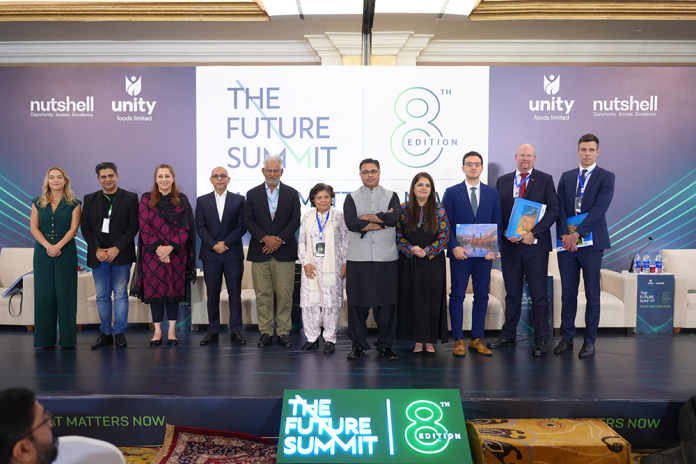Sadia Dada, Chief Distribution & Marketing Officer of KE spoke about the company’s ambitious target of reduction in scope 1 emissions by 20% by the year 2030, a goal that underscores the commitment of KE to sustainability. She highlighted the company’s sustainability journey, emphasising the key defining factor in the drive towards sustainability being the need for ‘putting actions behind words’. Dada referenced KE’s recent 10% reduction in Scope 1 emissions, equating to almost 0.8 million metric tonnes the previous year alone. To support this vision, KE has made specific pledges, Sadia Dada explained. She also mentioned that KE will not generate additional megawatts on imported fuel, and by 2030, 30% of the utility’s power supply will come from renewable sources.
“Our journey began by putting targets into place and disclosures are necessary to share information in black and white,” she said, accentuating the importance for accountability and the fact that these may be voluntary now but are likely to become mandatory in future from a regulatory perspective.
While further talking about setting targets, Dada said that KE was the first company in Pakistan to publish the gender pay-gap ratio, this was followed by an ‘instant desire to levelise it and the following year it was achieved.”
The panel discussion was centred around the topic ‘Risk to reward: Climate Solutions’ comprising of Ayla Majid – ACCA’s Global Deputy President and Founder & CEO, Planetive, Andrew Bailey – Managing Director, BASF Pakistan, Matteo Scalabrino, Associate, Bankers without Boundaries (BwB), Dr. Shamshad Akhtar – Chairperson, Pakistan Stock Exchange Ltd & Former Federal Minister for Finance & Former Governor, State Bank of Pakistan, Philip Skinner – Head of Middle East, North Africa & Pakistan, GuarantCo and Origination Lead for Nature, Private Infrastructure Development Group (PIDG), and Sadia Dada, Chief Distribution Officer at KE. The session was moderated by Sajjeed Aslam, Partner, SpectrEco LLC, USA.
The 8th Edition of The Future Summit (TFS), Pakistan’s premier corporate event, kicked off today in Karachi, with the second day scheduled for tomorrow, November 7, 2024. Jointly organised by Unity Foods Limited and Nutshell Conferences Group in strategic partnership with Faysal Bank Limited and the Overseas Investors Chamber of Commerce and Industry (OICCI), the summit gathered global and local leaders, industry experts, and decision-makers to discuss critical trends, innovative solutions, and collaborative strategies. The theme of this year’s summit is ‘What matters now.’
Ayla Majid while addressing a question about achieving net zero and the current position emphasised the need for a strategic approach to energy transition and decarbonization which are interlinked, acknowledging that high energy costs impact all sectors. She highlighted green hydrogen as a key opportunity, with the potential to meet 12% of global energy needs by 2050, yet noted its cost challenges compared to fossil fuels. Majid stressed that cross-border collaboration, policy stability, and the right infrastructure are essential to drive this shift, adding that Pakistan has the potential to be a hub for sustainable fuels if it addresses these elements effectively. Additionally, she pointed out the importance of building a carbon credit ecosystem while ascertaining the offtakers, and also preparing for future carbon taxation.
Philip Skinner highlighted that the most impactful nature-based solution is to directly invest in nature itself, particularly through infrastructure that relies on healthy ecosystems. He pointed out that Pakistan’s favourable geographic location positions it well for nature-based solutions such as wind farms and mangrove plantations. For example, planted mangroves not only enhance biodiversity but also save around millions in maintenance costs. In Sindh, integrating nature into infrastructure projects has attracted climate finance, created jobs, and supported livelihoods, benefiting both fisheries and agriculture.
Andrew Bailey emphasised that chemistry is integral to everyday life, with leading chemical companies worldwide focusing on sustainable innovations moving on. He shared that in Germany, the industry is shifting away from fossil-based resources toward solar, wind, and renewable raw materials, as well as pioneering recycling solutions, especially for plastics. He said that their goal is to chemically recycle plastics that cannot be traditionally recycled and gradually replacing fossil-based inputs.
Matteo Scalabrino spoke about carbon-neutral cities that can be replicated in Pakistan. He stressed the importance of integrating nature-based solutions alongside traditional financial structures.
Shamshad Akhtar while sharing her observation said that while the private sector is leading progress, the public sector needs to follow suit and appreciated that the non-profit sector is leveraging necessary skills. She emphasised the need for strategised thinking, citing the success of the textile industry as a model for nationwide growth. Akhtar also stressed the importance of a centralized approach to address provincial challenges and manage institutional issues effectively.
The panel discussion ended on the closing remarks by the moderator who emphasised upon the need for cross-border collaboration, supportive policies, and funding being crucial for addressing climate solution however, ultimately, the capacity and talent to address these issues tie everything together.


